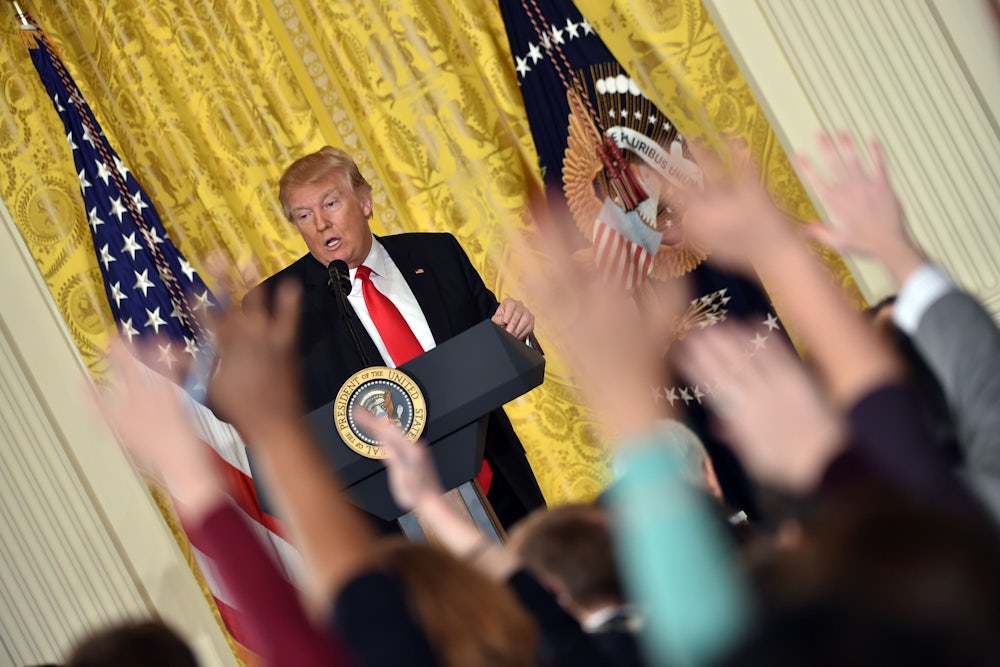President Donald Trump’s speech to Congress on Tuesday revealed less about the commander-in-chief than it did about the media, which displayed a palpable hunger for any signs of presidential maturity. Trump provided just such a sign when he honored William “Ryan” Owens, a fallen Navy SEAL whose widow was in attendance. “He became president of the United States in that moment, period,” CNN analyst Van Jones said. “That was one of the most extraordinary moments you have ever seen in American politics, period.” Jones was hardly alone, as a consensus emerged among an influential swath of the mainstream media—not just pundits like Jones, but political reporters—that Trump was finally behaving like a proper president.
This is @realDonaldTrump at his most presidential -- his most effective speech yet
— Jonathan Karl (@jonkarl) March 1, 2017
What the President did w Owen's widow was capital P Presidential. It was the single most extraordinary moment I've seen from Trump - by far.
— Katy Tur (@KatyTurNBC) March 1, 2017
This D.C. press’ longing for Trump to uphold the dignity of the office reflects poorly on the practice of journalism, but makes some sense given the nature of the presidency itself: It’s a monarchical position, essentially.
In crafting the Constitution, the Founders copied the structure of the British system, with the president having the same role in the structure as the king, just as the House of Representatives is the counterpart to the House of Commons and the Senate to the House of Lords. In fact, some of the early founders were quite explicit about wanting the president to act as a de facto king. John Adams thought that George Washington should be addressed as “His Majesty the President” or “His Highness, the President of the United States of America, and Protector of the Rights of the Same.” As Adams wrote in 1790, “Take away thrones and crowns from among men, and there will be an end of all dominion and justice.”
Adams’s ideas about how to address the president weren’t taken up, but it is undeniable that over time, a monarchical mystique accrued around the presidency. “We elect a king for four years and give him absolute power within certain limits, which after all he can interpret for himself,” Secretary of State William Seward explained to a British journalist in 1868. The previous year, Attorney General Henry Stanbery told the Supreme Court, “I deny there is a particle less dignity belonging to the office of the President than to the office of the King of Great Britain or any other potentate on the face of the earth. He represents the majesty of the law and of the people as fully and as essentially, and with the same dignity, as does any absolute monarch or the head of any independent government in the world.”
Citing such sources, the theologian and political writer Michael Novak concluded in his 1974 book Choosing Our King: Powerful Symbols in Presidential Politics, “Every four years, Americans elect a king...The president of the United States is no mere manager of an insurance firm. The way he lives affects our image of ourselves. His style and his tastes weigh upon our spirits.” For insights on how the monarchical status of the president influences practical politics, Novak cited a 1967 memo by Richard Nixon advisor Ray Price, who wrote, “People identify with a President in a way they do with no other public figure. Potential presidents are measured against an ideal that’s a combination of leading man, God, father, hero, pope, king...”
Price also noted, shrewdly, that the media was not immune to the desire for a monarchical president: “The press may be better at rationalizing their prejudices, but the basic response remains an emotional one.” Price’s insight can be pushed much further: The media, especially the White House press corps, is far more vested than the general public in a president acting in a regal fashion. If the president is a king, then the press are his courtiers. They hang on his every word, follow him around, collect court gossip about him, and their success is determined by the access he gives them. Just as the courtiers of Louis IV hungered for some nod from their king, so the White House press corps longs for the president to give them exclusive interviews.
Trump is a paradoxical figure because he’s become an American king despite acting like a court jester. His became president not by emanating regal authority, but by name-calling against his opponents. Last May, writer Will Wilkinson astutely predicted how Trump would become president. “If this were a monarchy and Trump were taking part in a succession battle, he’d accuse his rivals of being secret bastards out of the line of succession,” Wilkinson wrote. “In America, ‘birtherism’ serves that function. Obama isn’t a legitimate president. Canadian Ted Cruz isn’t qualified to be president. Or Hillary Clinton deserves to be in jail, might even end up being in jail, so how can she be president? Etc. If you can’t directly undercut legitimacy like that, relentlessly ‘brand’ your opponent in a way that shows them to lack natural authority (‘little’ flop-sweat Marco, ‘low-energy’ Jeb, the listless Nancy) or sows questions about legitimacy (‘lyin’ Ted, ‘crooked’ Hillary).”
Because Trump was so successful at being the court jester, it’s hard to take him seriously as the president. But for many in the press, their entire raison d’etre is to cover the presidency. They are courtiers in search of a king, so they will leap to applaud any tiny “presidential” gesture that Trump makes.
